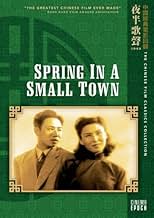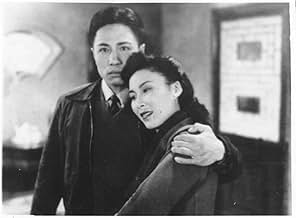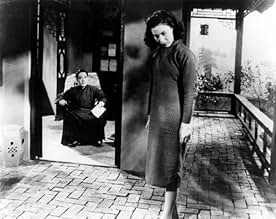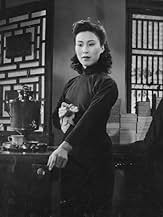Xiao cheng zhi chun
- 1948
- 1h 38min
CALIFICACIÓN DE IMDb
7.3/10
3.6 k
TU CALIFICACIÓN
Agrega una trama en tu idiomaA lonely housewife finds her monotonous life altered when her childhood sweetheart returns to town.A lonely housewife finds her monotonous life altered when her childhood sweetheart returns to town.A lonely housewife finds her monotonous life altered when her childhood sweetheart returns to town.
- Premios
- 1 premio ganado en total
- Dirección
- Guionista
- Todo el elenco y el equipo
- Producción, taquilla y más en IMDbPro
Opiniones destacadas
Xiao Chen Zhi Chun is a great movie, not only in the year it was shot but also now. It's an art movie which is not outdated even in 21st century. The director maintained a good narrative skill and thus made the story so smooth!
The movie reminds me of the later French new wave movie: Francois Truffaut's "Femme d'a cote" which is of the similar topic.
The movie reminds me of the later French new wave movie: Francois Truffaut's "Femme d'a cote" which is of the similar topic.
Very interesting to get this glimpse into China in the short interval after WWII and before the communists won the Civil War. We see the fashions of the period pre-communism and a story decidedly not in keeping with social realism or rosy propaganda; instead, these characters have real angst and it's a human tale ala Madame Bovary. The devastation of the country is mirrored in the ruins of the town and in the illness of a man (Yu Shi) living with his increasingly estranged wife (Wei Wei). She's dutiful to him, but the pair are no longer intimate or even in love. Enter her old lover (Li Wei), a doctor who somehow slipped away from her a few years ago, and an illicit love triangle secretly begins simmering.
I loved the first half of the film, where the conflict and desire is told through glances and silences, and it wasn't clear what would happen. Complicating matters (in a good way) is the presence of a cheery 16-year-old sister who is also a possible love interest for the doctor. The film is a little creaky but director Fei Mu gives us some wonderful shots along the old city walls, the breeze fluttering through the grasses as the lovers stir each other's desires. The pace bogs down a little bit as the characters search for resolution to the struggle, with various contemplations of withdrawal, suicide, and even murder. The lovers also go through cycles which represents their torment, e.g. in a moment of passion the doctor whisking the woman off her feet and into his arms, and in the very next, putting her down, walking out the door and locking it. In all of the melodrama it seemed to me the story-telling wasn't as clean as it could have been, and I wasn't as swept up in the emotions of the ending as much as a result. It's interesting to think about the understated emotion and restraint here as it compares to 'In the Mood for Love' (2000) though, and the two films might make an interesting double feature.
I loved the first half of the film, where the conflict and desire is told through glances and silences, and it wasn't clear what would happen. Complicating matters (in a good way) is the presence of a cheery 16-year-old sister who is also a possible love interest for the doctor. The film is a little creaky but director Fei Mu gives us some wonderful shots along the old city walls, the breeze fluttering through the grasses as the lovers stir each other's desires. The pace bogs down a little bit as the characters search for resolution to the struggle, with various contemplations of withdrawal, suicide, and even murder. The lovers also go through cycles which represents their torment, e.g. in a moment of passion the doctor whisking the woman off her feet and into his arms, and in the very next, putting her down, walking out the door and locking it. In all of the melodrama it seemed to me the story-telling wasn't as clean as it could have been, and I wasn't as swept up in the emotions of the ending as much as a result. It's interesting to think about the understated emotion and restraint here as it compares to 'In the Mood for Love' (2000) though, and the two films might make an interesting double feature.
After a long war with Japan, Chinese society in 1948 was ravaged by the destruction and the deaths of the seven straight years of the conflict. This movie perfectly depicts the depression of that era and the hopelessness in simple village-folk, while bringing a rather simplistic love triangle story-line at the forefront. Among the most important elements depicted are the internal monologues of Zhou Yuwen (Wei Wei), which narrate her life and bring a unique proto-feminist perspective within a society that was used to female subservience.
Film-making wise, noteworthy moments are the long walks along the ravaged (presumably by Japanese bombs) wall, as well as, the completely silent scenes that happen along the way, that add to the eeriness of the movie.
Film-making wise, noteworthy moments are the long walks along the ravaged (presumably by Japanese bombs) wall, as well as, the completely silent scenes that happen along the way, that add to the eeriness of the movie.
"Spring in a Small Town" is a remarkable fusion of classic form and the convincingly real. It moves from its central character, Yuwen, who is isolated in a small town, and in an arranged marriage with an ill neurasthenic husband, Lyan; and moves too from a truly enduring acting job by Wei Wei as Yuwen.
The story revolves around memory: memory of love, and memory of a pre-war period of youthful promise. These moments of being are stirred to life by the visit of the husband's long estranged friend Zhang, who is now a city doctor. Zhang means renewed life and vigor at the desolate, war ruined estate of the noble Lyan, and love and passion to Yuwen, who happens to have been someone she once loved as a teen.
But Zhang's surprising appearance is more widening of vision than epiphanal. It's complicated by Yuwen's passionate desires and longings concentrated under the guise of romance, the doctor's scruples and detachment, her husband's illness, depression, and stoic passivity, and her sister-in-law's budding mutual relationship with Zhang. But there is no love triangle here, nor double love-triangle--something far more subtle is happening and it's happening in that whole arena suggestive of love and affection--one that extends into a range of human emotions, but is not romantic love itself.
Although there is clearly a patriarchal social world at work here, its oppressions are not exactly active in or bearing down on the two male and two female characters of this intimate drama. Each character has a kind of self-direction which comes from some inner sense of integrity, and acceptance of the life dealt them. They have deep emotions, but these are more felt than viewed. In other words, no one character dominates any other, so that each is free to call upon aspects of themselves which can result in self-determined responses and/or personal changes that are small but lasting adjustments.
The result is a world of stasis and intimacy which bears the physical-ness of the natural world. The characters seem to be as embodied as the stones of the ancient walls of the estate. They exist and move in a kind of equal world in which each senses the most minute emotion, movement, or thought in another--sometimes in soundless scenes. Honesty and simplicity arising from honoring the complexity of human-ness are what sets Fei Mu's film apart.
"Spring" is one of the most beautiful of all films because the things of beauty, sensuality, love, the natural world are more akin to hints than expressions. A breeze, spring sunshine, plants, the moon, water, fire are almost unnoticeably present, as are glimmering lights in an interior stillness. And all this bears more weight because of the period between war and change which seems to create a profounder environment. One in which the destruction of towns and persons is experienced in say the town's depopulation or the mild husband's bitterness and self-defeat. Yes, buildings and lives are equally vulnerable in Fei Mu's somewhat inconsolable world.
But "Spring" is as much about spring, as it is about the gravitas of war. Lyan's young sister Xiu has a youthful spontaneous presence which with all its trust, directness, driving sympathy pushes both her brother into re-connecting to memory, and her sister-in-law into and through the painful memory of Zhang's failure to be in love with her back then.
In the end, Yuwen may not be less alone, but she is more in sync with her husband's now awakened life and affection and more in touch with her own emotional life which was deeper than what she understood it to be. Dr. Zhang and Liyan do not answer her passions, but they have both contributed to her more certain grasp of them. There is a touch of sadness at end though, because the male social structures are still in place and Yuwen needs a fuller life--it's perhaps promised in her sister-in-laws embrace of all that must await both women.
The story revolves around memory: memory of love, and memory of a pre-war period of youthful promise. These moments of being are stirred to life by the visit of the husband's long estranged friend Zhang, who is now a city doctor. Zhang means renewed life and vigor at the desolate, war ruined estate of the noble Lyan, and love and passion to Yuwen, who happens to have been someone she once loved as a teen.
But Zhang's surprising appearance is more widening of vision than epiphanal. It's complicated by Yuwen's passionate desires and longings concentrated under the guise of romance, the doctor's scruples and detachment, her husband's illness, depression, and stoic passivity, and her sister-in-law's budding mutual relationship with Zhang. But there is no love triangle here, nor double love-triangle--something far more subtle is happening and it's happening in that whole arena suggestive of love and affection--one that extends into a range of human emotions, but is not romantic love itself.
Although there is clearly a patriarchal social world at work here, its oppressions are not exactly active in or bearing down on the two male and two female characters of this intimate drama. Each character has a kind of self-direction which comes from some inner sense of integrity, and acceptance of the life dealt them. They have deep emotions, but these are more felt than viewed. In other words, no one character dominates any other, so that each is free to call upon aspects of themselves which can result in self-determined responses and/or personal changes that are small but lasting adjustments.
The result is a world of stasis and intimacy which bears the physical-ness of the natural world. The characters seem to be as embodied as the stones of the ancient walls of the estate. They exist and move in a kind of equal world in which each senses the most minute emotion, movement, or thought in another--sometimes in soundless scenes. Honesty and simplicity arising from honoring the complexity of human-ness are what sets Fei Mu's film apart.
"Spring" is one of the most beautiful of all films because the things of beauty, sensuality, love, the natural world are more akin to hints than expressions. A breeze, spring sunshine, plants, the moon, water, fire are almost unnoticeably present, as are glimmering lights in an interior stillness. And all this bears more weight because of the period between war and change which seems to create a profounder environment. One in which the destruction of towns and persons is experienced in say the town's depopulation or the mild husband's bitterness and self-defeat. Yes, buildings and lives are equally vulnerable in Fei Mu's somewhat inconsolable world.
But "Spring" is as much about spring, as it is about the gravitas of war. Lyan's young sister Xiu has a youthful spontaneous presence which with all its trust, directness, driving sympathy pushes both her brother into re-connecting to memory, and her sister-in-law into and through the painful memory of Zhang's failure to be in love with her back then.
In the end, Yuwen may not be less alone, but she is more in sync with her husband's now awakened life and affection and more in touch with her own emotional life which was deeper than what she understood it to be. Dr. Zhang and Liyan do not answer her passions, but they have both contributed to her more certain grasp of them. There is a touch of sadness at end though, because the male social structures are still in place and Yuwen needs a fuller life--it's perhaps promised in her sister-in-laws embrace of all that must await both women.
"Spring in a Small Town" is a very simple movie--a simple premise, a small cast and it's all done in a very restrained manner. It's a definite example of minimalistic cinema and is worth your time.
The film is set in rural China--just a year before the Communist takeover. Liyan is sickly--with tuberculosis. However, his main problem is depression--he feels very sorry for himself and has no will to do anything. Most of the time, he just sits outside and broods. Not surprisingly, his wife (Yuwen) is not happy but is quite dutiful towards her husband. Into this sad family comes a surprise visit from one of Liyan's old friends who he hasn't seen in a decade. But it gets more complicated. The friend (Zhang) is shocked to see that Liyan's wife is his old lover!! Not surprisingly, he and Yuwen say nothing and at first, they keep their distance. Where does all this go? It probably doesn't go exactly where you expect....see it and find out for yourself.
My score of 8 is awfully high for such a simple film, but I was impressed that the movie was handled so simply and honestly. My only complaint, and you can't blame the filmmakers, is that the quality of the DVD print is pretty poor. My assumption is that Cinema Epoch did not have access to a better copy--though it would be nice to see this film restored to eliminate the scratches and clean everything up a bit.
The film is set in rural China--just a year before the Communist takeover. Liyan is sickly--with tuberculosis. However, his main problem is depression--he feels very sorry for himself and has no will to do anything. Most of the time, he just sits outside and broods. Not surprisingly, his wife (Yuwen) is not happy but is quite dutiful towards her husband. Into this sad family comes a surprise visit from one of Liyan's old friends who he hasn't seen in a decade. But it gets more complicated. The friend (Zhang) is shocked to see that Liyan's wife is his old lover!! Not surprisingly, he and Yuwen say nothing and at first, they keep their distance. Where does all this go? It probably doesn't go exactly where you expect....see it and find out for yourself.
My score of 8 is awfully high for such a simple film, but I was impressed that the movie was handled so simply and honestly. My only complaint, and you can't blame the filmmakers, is that the quality of the DVD print is pretty poor. My assumption is that Cinema Epoch did not have access to a better copy--though it would be nice to see this film restored to eliminate the scratches and clean everything up a bit.
¿Sabías que…?
- TriviaVoted the best Chinese-language film of all time by the Hong Kong Film Academy in 2004.
- Versiones alternativasThere is an Italian edition of this film on DVD, distributed by DNA Srl: " PRIMAVERA IN UNA PICCOLA CITTÀ (Spring in a Small Town, 1948) + LA DEA (The Goddess, 1934)" (2 Films on a single DVD). The film has been re-edited with the contribution of film historian Riccardo Cusin. This version is also available for streaming on some platforms.
- ConexionesFeatured in Venice 70: Future Reloaded: Zhangke Jia (2013)
Selecciones populares
Inicia sesión para calificar y agrega a la lista de videos para obtener recomendaciones personalizadas
- How long is Spring in a Small Town?Con tecnología de Alexa
Detalles
- Fecha de lanzamiento
- País de origen
- Idioma
- También se conoce como
- Spring in a Small Town
- Productora
- Ver más créditos de la compañía en IMDbPro
- Tiempo de ejecución1 hora 38 minutos
- Color
- Mezcla de sonido
- Relación de aspecto
- 1.37 : 1
Contribuir a esta página
Sugiere una edición o agrega el contenido que falta

Principales brechas de datos
By what name was Xiao cheng zhi chun (1948) officially released in India in English?
Responda






















